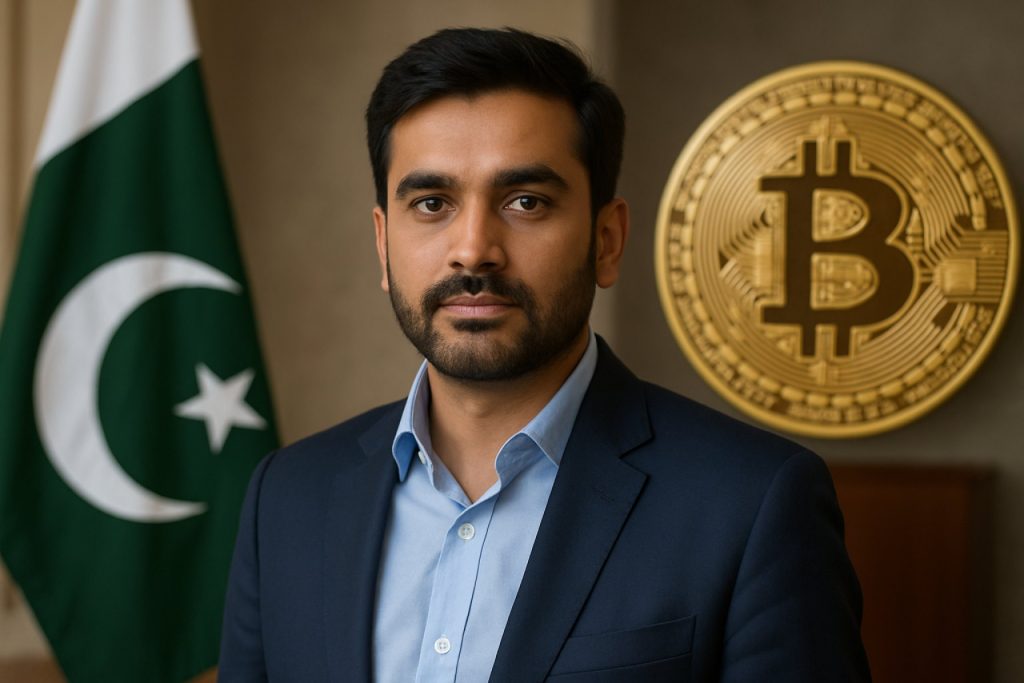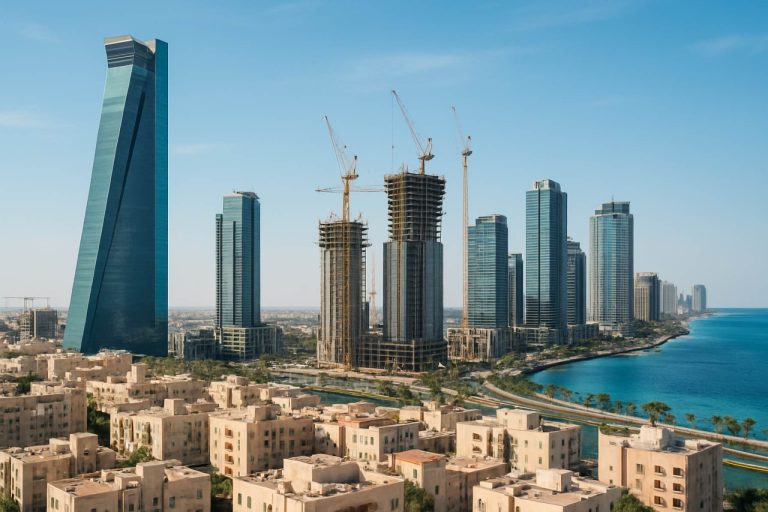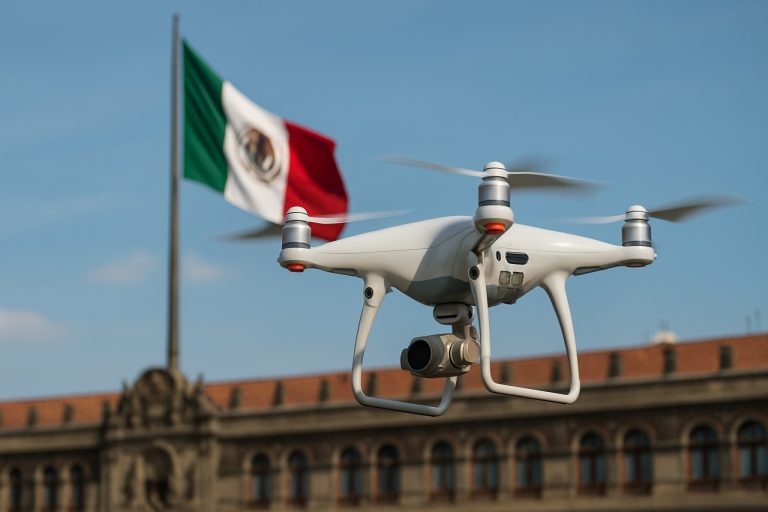
- Pakistan is accelerating its digital transformation through blockchain and cryptocurrency under the leadership of Bilal Bin Saqib, Special Assistant to the Prime Minister on Blockchain and Crypto.
- The country has over 40 million crypto users, $300 billion in annual digital asset trading, and ranks in the global top 10 for grassroots crypto adoption.
- Saqib’s agenda includes developing a robust regulatory framework (aligned with FATF), scaling Bitcoin mining, integrating blockchain across sectors, and protecting consumers via licensed virtual asset providers.
- International partnerships, including with Binance’s Changpeng Zhao, are connecting Pakistan’s innovation ecosystem to the global Web3 landscape.
- Pakistan’s youthful, tech-savvy population and strategic policy investments position it to leapfrog outdated systems and build a resilient, transparent digital economy.
A new chapter for Pakistan’s digital future is being written amidst the hum of servers and the flicker of blockchain code—guided by the sharp intellect and social impact pedigree of Bilal Bin Saqib. Elevated to the role of Special Assistant to the Prime Minister on Blockchain and Crypto, Saqib’s appointment signals something unprecedented: Pakistan isn’t just catching up to the digital revolution. It’s striding confidently to the front.
The halls of power in Islamabad now reverberate with discussion about Bitcoin mining, regulatory frameworks, and virtual asset service providers. With state ministerial authority in his hands, Saqib’s charge goes beyond symbolic leadership—it means real policy, real investment, real transformation.
At only 30-something, this London School of Economics alumnus—crowned by the likes of Forbes Asia 30 Under 30 and recognized with a coveted MBE from King Charles III—has already redefined entrepreneurship through social innovation. Now, as Chief Executive Officer of the Pakistan Crypto Council, he sits at the nexus of the nation’s digital awakening. Under his stewardship, the Council has forged ambitious alliances, including a groundbreaking partnership with the decentralized finance player World Liberty Financial (WLF).
What makes Pakistan’s digital momentum unique? Numbers tell the story. This South Asian giant boasts an estimated 40 million crypto users, with annual digital asset trading volumes surging beyond $300 billion. The 2023 Chainalysis Global Crypto Adoption Index places Pakistan among the world’s top 10 for grassroots crypto usage. As the world’s fourth-largest hub for freelancers and with 40,000 IT graduates entering the workforce each year, the country is brimming with tech-driven aspiration. Over 60% of the population is younger than 30—a demographic time bomb ready to fuel the engines of Web3.
Saqib’s agenda is as ambitious as it is vital:
- Craft a regulatory framework for digital assets, strictly observing FATF standards
- Launch and scale up Bitcoin mining for sustainable economic impact
- Integrate blockchain tech across governance, finance, and real estate
- Supervise licensing of virtual asset service providers, enhancing consumer protections
- Bridge Pakistani innovation with the international ecosystem through key advisers like Changpeng Zhao, founder of Binance
This isn’t a solo climb. By enlisting global icons and championing a forward-thinking approach, Pakistan joins an elite league with the United States, El Salvador, and the UAE—nations that have vested legislative and regulatory might in the charting of crypto’s future. This mirrors recent moves in Washington, where technology czars are spearheading U.S. policy on artificial intelligence and digital assets.
Yet the stakes in Pakistan are uniquely high: With political will and demographic energy, the country is poised to leapfrog legacy systems, providing the kind of transparency, security, and speed that blockchain technology promises but seldom delivers at scale.
The clear message resonates from the streets of Karachi to the tech parks of Lahore: Strategic investment in digital assets isn’t just an opportunity—it’s Pakistan’s imperative for global relevance and resilience.
For more on global technology and economic news, visit the official website of New York Times.
The world is watching as Pakistan unleashes its youth, talent, and ambition on the blockchain frontier. The next chapter in the global digital economy may well be written here—by a generation ready to make history.
Paksitan’s Crypto Revolution: How Bilal Bin Saqib Is Turning Ambition into Action
Summary
Pakistan is embarking on an unprecedented digital transformation, with the appointment of Bilal Bin Saqib as Special Assistant to the Prime Minister for Blockchain and Crypto signaling a new era. Harnessing a young, tech-savvy population, high-level partnerships, and clear policy initiatives, Pakistan aims to become a regional leader in crypto innovation and blockchain adoption.
—
Additional Key Facts Not Fully Explored
1. Pakistan’s Digital Asset Market: Unique Features and Data
– Remittance Powerhouse: According to the World Bank, Pakistan is among the top ten countries receiving remittances, with over $31 billion inflow in 2022. Crypto platforms—particularly stablecoins—help facilitate faster, lower-cost cross-border transactions ([World Bank](https://www.worldbank.org)).
– Mobile Penetration: Over 185 million cellular subscribers and 123 million 3G/4G users as per PTA (Pakistan Telecommunication Authority), providing a fertile ground for widespread crypto wallet adoption.
– P2P Exchanges Thrive: Despite previous banking restrictions, peer-to-peer crypto trading via WhatsApp and informal networks has flourished.
2. How-To Steps: Buying Crypto Legally in Pakistan (2024)
– Step 1: Choose a licensed Virtual Asset Service Provider (to be regulated soon).
– Step 2: Complete identity verification (KYC) based on FATF standards.
– Step 3: Deposit fiat currency (PKR) via authorized channels.
– Step 4: Purchase and withdraw crypto to your secure wallet.
– Step 5: Declare holdings if/when regulations recommend or require taxation.
– Tip: Always check for updated government notifications on crypto policy.
3. Real-World Use Cases & Life Hacks
– Freelancer Payments: Freelancers use USDT (Tether) to bypass payment delays from PayPal/Hundi, reducing transaction time from days to minutes.
– Agriculture & Food Traceability: Blockchain is piloted for seed-to-store transparency, fighting food fraud and ensuring safety.
– Property Management: Smart contracts promise instant land registry transfers, curbing property scams and official corruption.
4. Market Forecasts & Trends
– Surge in Startup Activity: According to Invest2Innovate Insights, the number of blockchain startups in Pakistan more than doubled from 2021 to 2023.
– IPO Prospects: Industry insiders speculate that regulated Pakistani crypto platforms could go public in the next 3 years, opening up investment.
– Talent Export: Demand for skilled blockchain engineers is rising in Gulf markets, with Pakistani developers being actively recruited.
5. Limitations, Controversies & Security
– Banking Restrictions: Past bans have led to significant P2P (peer-to-peer) activity outside formal channels.
– Regulatory Uncertainty: Lack of clarity fuels scams, MLM “token” ponzis, and investor risks.
– Environmental Concerns: Sustainable Bitcoin mining remains theoretical, with hydropower under consideration to avoid coal dependency.
– FATF Scrutiny: Pakistan was recently removed from the FATF grey list, adding motivation but also strict oversight for anything crypto.
6. International Comparisons
– El Salvador: Made Bitcoin legal tender, but faced technical setbacks and IMF pushback.
– UAE: Established ADGM and DMCC crypto zones for rapid licensing—Pakistan looks to adopt a similar “sandbox” approach.
– Nigeria: Ranked globally for P2P trading; Pakistan’s remittance-driven adoption model is closely linked.
7. Features, Specs & Pricing (Pakistani Market)
– Fees: Top exchanges charge 0.2-1% trade fees, far cheaper than Western platforms.
– Minimum Investments: Platforms like Binance and Rain require as little as $10 (PKR 2,700) account funding.
– Security: Self-custody wallets recommended (MetaMask, TrustWallet) due to ongoing exchange volatility.
8. Insights, Predictions & Policy Watch
– Upcoming Regulation: 2024 will likely see the first digital asset bill tabled in parliament, mirroring Dubai’s VARA framework.
– CBDC Potential: Pakistan’s central bank is exploring a Rupee-backed digital currency—expected to enter pilot by 2025.
– Gender Inclusion: More training opportunities for women in blockchain coding via public-private partnerships.
—
Most Pressing Reader Questions
Is it Legal to Buy and Trade Crypto in Pakistan?
– As of June 2024, crypto is not illegal but operates in a gray area. Formal regulation will soon clarify onboarding and investor protection. Rely only on licensed channels when they become available.
How is Blockchain Being Integrated Into Governance?
– Pilot programs include land record digitization in Punjab, supply chain tracking, and educational credential verification.
Will Crypto Bring Economic Benefits to Ordinary Pakistanis?
– Yes, especially for freelancers, SMEs, and diaspora families who benefit from cheaper, faster remittances.
What Are the Main Risks?
– Regulatory risk, exchange hacks, and pyramid schemes. Only use reputable platforms and keep learning about digital security.
How Can Pakistan Lead in the International Crypto Scene?
– By leveraging its youth dividend, high-volume remittance corridors, energy potential for Bitcoin mining, and tech talent, Pakistan can create tailored regulatory and innovation sandboxes.
—
Actionable Recommendations & Quick Tips
1. Stay Updated: Follow official government and SBP (State Bank of Pakistan) notices as the regulatory landscape evolves.
2. Educate Yourself: Explore free courses in blockchain (Coursera, Udemy) and online Pakistani community forums.
3. Try Safely: Use small amounts to familiarize yourself with exchanges, starting with testnets and demo accounts.
4. Guard Against Scams: Never invest in unverified schemes. Always enable 2FA and use reputable wallets.
5. Network: Join local meetups, hackathons, and training sessions to connect with developers and entrepreneurs.
—
Conclusion: Seize the Digital Moment
With innovation-friendly leaders like Bilal Bin Saqib driving systemic change, a young educated population, and strategic international partnerships, Pakistan is on the verge of digital transformation. Crypto assets and blockchain technology—if managed prudently—could help Pakistan leapfrog legacy financial systems, boost transparency, and empower millions.
For consistent updates on the evolving global economic and digital scene, readers can visit trusted sources such as the New York Times.
The next tech frontier is open for Pakistani talent—get informed, get involved, and stay secure!



